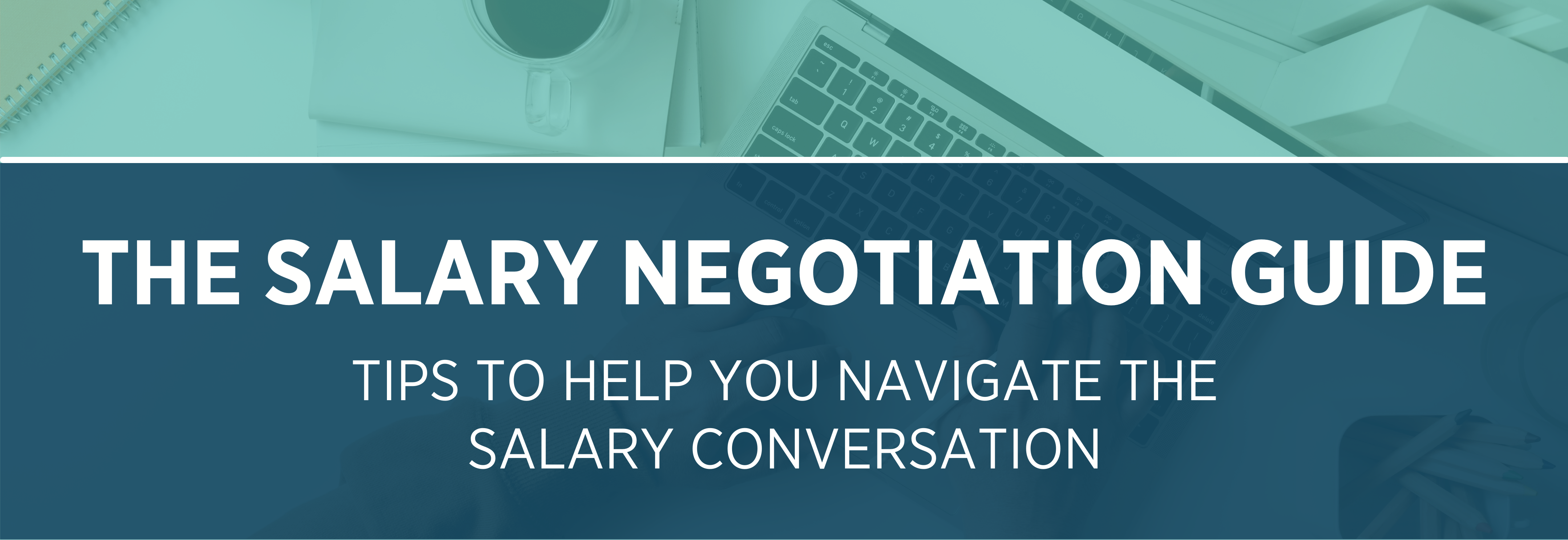
How to Negotiate Your Salary
Whether you’ve aced your second interview and are now on the road to accepting an offer, or you’re currently up for a promotion and a raise in your current position, the time to negotiate your pay has arrived. While the thought of negotiating your salary may feel awkward or uncomfortable, it’s a step that needs to be taken to ensure you’re paid fairly and equitably in today’s job market.

Negotiate Your Salary With Confidence
Money is a sensitive subject to discuss, but when it comes to getting a new job, negotiating your salary is inevitable. When working with a recruiter, it’s important to be as transparent as possible when sharing your desired salary requirements, as this will help them better tailor the job opportunities you may be presented with, as recruiters don’t want to put you in a position where you’ll be underpaid.
Your experience level, current job responsibilities, and industry standards all play a role in determining what you should be getting paid. Doing market research to determine the industry and job specific salary range you should be within will be very helpful in preparing for your salary conversation and potential negotiation. According to our recent Compensation and Benefits Report, only 23% of employees are currently satisfied with their salary, so coming prepared with industry benchmarks will help to ensure you get paid what you’re worth.
At 24 Seven, our recruiters recommend going into these salary conversations with confidence and poise. Be prepared to speak to your experience and skillset, answer questions that arise, and stay honest and humble in your approach.
TOP 5 TIPS
- Plan - If you are on the road to accepting an offer or are up for a promotion at your current job, it is important to plan for the negotiation conversation. Unfortunately, it may not be something you can set a meeting for, but it is definitely an important note to keep in the back of your head during all offer and salary focused conversations.
- Prepare - Think about ways to bring up the topic in case it doesn't come up organically in the conversion. Prepare with knowing industry standards, keeping in mind your current lifestyle and financial needs. Role playing the conversation with a friend or family member will also help you feel more confident when the time comes.
- Prove Yourself - If you don't have the reasons for why you deserve more money than what has been offered, why should the company accept your counter offer? You know why you deserve a higher amount, so be prepared to tell them those exact reasons.
- Get Exact - Several sources say that it is better to be exact than to give a range. Get exact with the amount you desire, shoot for the top of the range, and be ready to negotiate down by smaller increments to meet collectively in the middle.
- Prioritize - Be ready for positive and negative answers and lots of feedback. Know what the lowest you will accept is, know what you will say or do if they decline your offer, and think of other benefits to negotiate that may balance the salary if they decline to raise the amount.

Salary vs. Rate
If you you’re looking for a job that offers you freedom and flexibility, now may be the perfect time to freelance. Freelancers are increasingly in-demand as companies continue to gravitate towards a more flexible talent management model. However, don't think that making the switch to freelance will save you from having to negotiate your salary, as you’ll need to determine an hourly rate that’s right for you. Freelance rates tend to net out higher than annual salaries, as you'll be responsible for covering your own healthcare benefits and supplying your own tools. This is where a freelance recruiter can really guide you on the market and how much to charge.
What is the Salary Ban? Know Your Rights
One of the goals of the Salary Ban law is to narrow the gender wage gap in specific states. The idea is that if women are already getting paid less than men, the pay inequity will continue if their salary for a new role is based on previous, unequal pay. The aim instead is to have companies proactively determine a pay range for roles without consideration of an applicant’s salary history – relying instead on a combination of merit, experience level, market factors and competitive benchmarks.
Recommended Salary Research Resources
How to Negotiate Salary: 37 Tips You Need to Know
13 Tips to Negotiate Your Salary and Job Offer
Everything You Need to Know About Asking for a Raise
Interested in exploring current salary benchmarks in today’s job market? Click here!